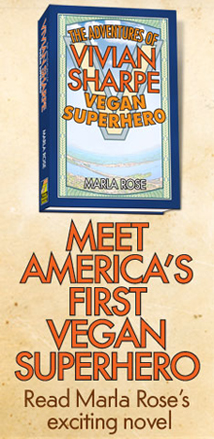
Available in either softbound or Kindle/Nook/etc. eBook at Amazon
viviansharpe.com

  11 The health benefits of a plant-based diet. Many people who come to veganism find it while pursuing better health or weight loss goals. While it’s true that achieving better health or weight loss remains a popular preoccupation, the fact remains that veganism is at its core a philosophy and practice that rejects the commodification of other animals and seeks justice and compassion for all species, in the words of Vegan Society founder Donald Watson, as far as is possible and practicable. While what vegans eat (and do not eat) is undeniably central to a the practice, veganism is not a diet: it is a social justice issue and its scope encompasses much more than simply what we eat. That said, many people come to veganism through the door of health improvement and that is both understandable and their prerogative. Someone who adopts the dietary habits without the other aspects of veganism - for example, avoiding purchasing products that are made from or tested on animals and withdrawing support from industries that exploit animals, like circuses or rodeos - would be called plant-based. This is not an insult or a judgement; this is not trying to kick anyone out of a club. This is simply being clear on the founding principles of veganism. Such people are still creating enormous good in the world and deserve acknowledgement for that. In fact, many people who start out as “health vegans” deepen their ethical convictions as they learn more and grow to become powerful voices of compassion for the animals. Now, regarding health and body size claims: you may have heard that vegans are all slim, we don’t get cancer or diabetes, that we look many years younger than our chronological age and we never get sick. (Honestly, depending on who’s around you, you may have heard the opposite as well.) Too often, in our zeal to persuade non-vegans to give up meat and animal products, vegans may make health claims that are not grounded in fact or currently available research. Additionally, as veganism has grown in popularity, different diets are being promoted under the plant-based umbrella, from fruitarianism to low-carb, raw foods diets to high-carb, low-fat to high-fat, all with promises of being the Ultimate Health-Promoting Diet. In this cacophonous and fraught landscape, especially with social media’s pervasive influence on our lives magnifying our anxieties about not being slim or healthy enough, it can feel very stressful and confusing. It can also be difficult to sort fact from fiction. I think the first thing to do is remind yourself that veganism is not a diet. Second, it is very reasonable to want to look and feel how you feel is your best, so modifying your diet to best pursue those goals is understandable, but bear in mind that different individuals have different needs for optimal thriving. In other words, some people might feel their best by emphasizing carbs like potatoes and pasta; others might flourish on primarily raw vegetables. And many of us do fine as “just” vegans, remembering again that baseline of veganism from a dietary standpoint is not about eliminating foods and ingredients that are deemed unhealthy, but avoiding consuming anything of animal origin. I say “deemed unhealthy” with the caveat that there is no final word on what is and is not healthy and in what amounts. Take rice, for example: for a high-carb vegan, rice can form basis of one’s diet; to a raw foodist, rice is not a natural part of the human diet. Fruitarians eat loads of melons, mangos and bananas; to a low-carb vegan, that is too much emphasis on sugars. Putting all that aside, there are certain things we know about a plant-based diet and human physiology. For example: • You may lose weight. In a study with research subjects eating the same amount of calories, vegans had the lowest mean body mass index. • You may be more “regular” and have a reduced risk of diverticulitis. High-fiber, water-packed foods help bowel movements progress through the digestive tract more easily. • Your hypertension risk is reduced. The lower saturated fat content of most vegan diets is also associated with lower blood cholesterol concentrations, incidence and mortality from stroke and ischemic heart disease. • You may have a moderate protection against cancer overall as well as certain other cancers, like prostate. The phytochemicals in an array of plant-based foods provide antioxidants that can be protective against certain cancers. • You may have a reduced risk of Type 2 diabetes with a low-fat vegan diet, which improves beta-cell function and insulin resistance. None of this, of course, is a guarantee, nor does it imply anything about vegans who face health challenges. Vegans come in all shapes and sizes, vegans get sick, and vegans are mortal. Our point is that vegans are not bulletproof and we should stop repeating exaggerated and spurious health claims. For more reading on this subject, please consider reading Even Vegans Die: A Practical Guide to Caregiving, Acceptance and Protecting Your Legacy of Compassion and checking out co-author Ginny Kisch Messina’s wonderful and educational blog. < Previous page . . Next page > ALL CHAPTERS Intro: Welcome new vegan! 1. Finding your way in an imperfect world 2. Make peace with making mistakes 3. Find community 4. Don't overload on disturbing videos and content 5. Develop your vegan voice and assertiveness 6. Stay strong against social pressure and gain resilience as a vegan 7. Learn how to cook, even just a little 8. Technology helps you over hurdles 9. Listen to vegan podcasts 10. Take advantage of other resources 11. The health benefits of a plant-based diet 12. Don't let yourself get famished 13. Expect that your digestive system might take a little while to get straightened out 14. Untangle and tame food cravings 15. Dining out as a vegan 16. A primer on vegan kitchen appliances, tools & gadgets 17. Bring joy to your vegan practice © 2013-2018, Vegan Street |













 |
 |
 |
 |
 |
 |
 |